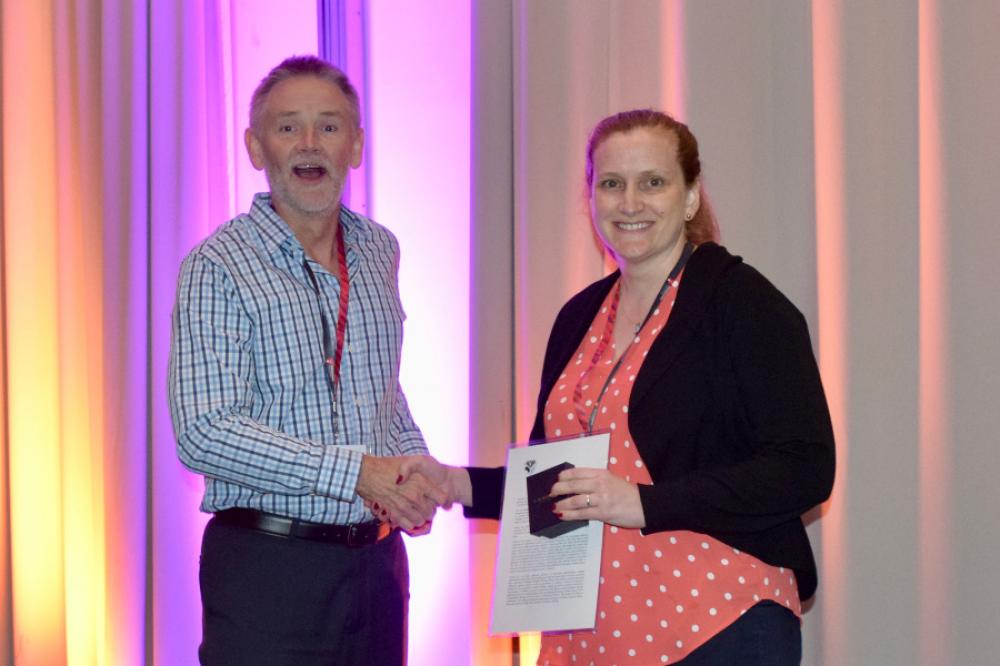The 2020 JH Michell Medal
The JH Michell Medal, named in honour of John Henry Michell, is awarded annually by ANZIAM to an outstanding new researcher who has undertaken distinguished research in applied and/or industrial mathematics, where a significant proportion of the research has been carried out in Australia and/or New Zealand. There have been 18 winners of the JH Michell Medal, dating back to 1999.
The JH Michell Medal Committee for 2020 is unanimous in recommending that the 2020 JH Michell Medal be awarded to Associate Professor Jennifer Flegg of the University of Melbourne. Jennifer is an outstanding scientist and her work brings applied mathematics and advanced computational statistics to critical areas of health and biological sciences.

(Photo Credit: Mark McGuinness)
By all standard metrics, Jennifer’s CV is impressive: she has received multiple major competitive grants, including from the ARC, NH&MRC and the Commonwealth Government of Australia. She has an extensive international publication record with 44 publications, including 15 first-author, 11 second-author and 3 senior-author publications. Her publications appear in high profile journals, and have been cited over 3000 times.
Jennifer has established an outstanding record of research excellence in mathematical modelling over a broad range of applications, but we highlight here two substantial contributions to mathematical biology: the spread of antimalarial drug resistance; and tissue repair.
Working with partners at the University of Oxford, Jennifer has developed predictive spatiotemporal mathematical models of the spread of resistance to the drugs used to treat malaria. Her models predict drug resistance in space and time over Africa and the Mekong region using data which is sparsely available in these regions. Her models have already had impact, with the World Health Organization (WHO) using them to update their policies on where and when certain drugs should be used. Jennifer’s predictive maps of drug resistance in Africa were combined with clinical data on birthweight in an analysis conducted by a WHO Resistance Technical Expert Group to show that if the prevalence of resistance is more than 30% then the drug should be considered compromised, and countries should switch to alternative strategies. Her work in this field has been published in high quality, interdisciplinary journals including the New England Journal of Medicine.
Jennifer has also made significant advances in developing experimentally-validated mathematical models which provide biological insight into tissue repair in chronic wounds and allow assessment of treatment therapies. Working closely with clinicians, she has used partial differential equation models to study oxygen therapy for diabetic wounds and compression therapy for venous leg ulcers. Using her models, Jennifer has derived conditions which allow the stimulation of healing in chronic wounds that would otherwise remain unhealed. She has published her work on wound healing in the top mathematical biology journals such as PLOS Computational Biology and the Journal of Theoretical Biology. This research has been in collaboration with leading international mathematical biologists, including Professors Helen Byrne and Professor Phillip Maini from the University of Oxford.
Jennifer is on the Editorial Board for both the Bulletin of Mathematical Biology, which is the official journal of the Society for Mathematical Biology (SMB), and Scientific Reports. She was also Editor-in-chief of the quarterly SMB Newsletter from 2017-2019. She currently supervises six PhD and three MSc students.
Jennifer is emerging as a future leader in mathematical biology and interdisciplinary mathematics in Australia and more broadly. Her leadership and authority in this domain has been recognised internationally and domestically with her invitation as a plenary speaker at the 2018 Society of Mathematical Biology (SMB) Annual meeting, the premier international meeting in the mathematical biology field, and an invitation to be a plenary speaker at the 2020 Australia and New Zealand Industrial and Applied Mathematics (ANZIAM) conference. The ease with which she collaborates, her breadth of knowledge across both applied mathematics and statistics, coupled with her passion to use her mathematical talents to have impact in the world, have helped her already achieve a significant reputation.
The committee regards Associate Professor Jennifer Flegg as an outstanding early career researcher and a worthy recipient of the 2020 JH Michell Medal.
Congratulations Jennifer.
Prof Nigel Bean (Chair)
Dr Alys Clark
Prof Scott McCue


